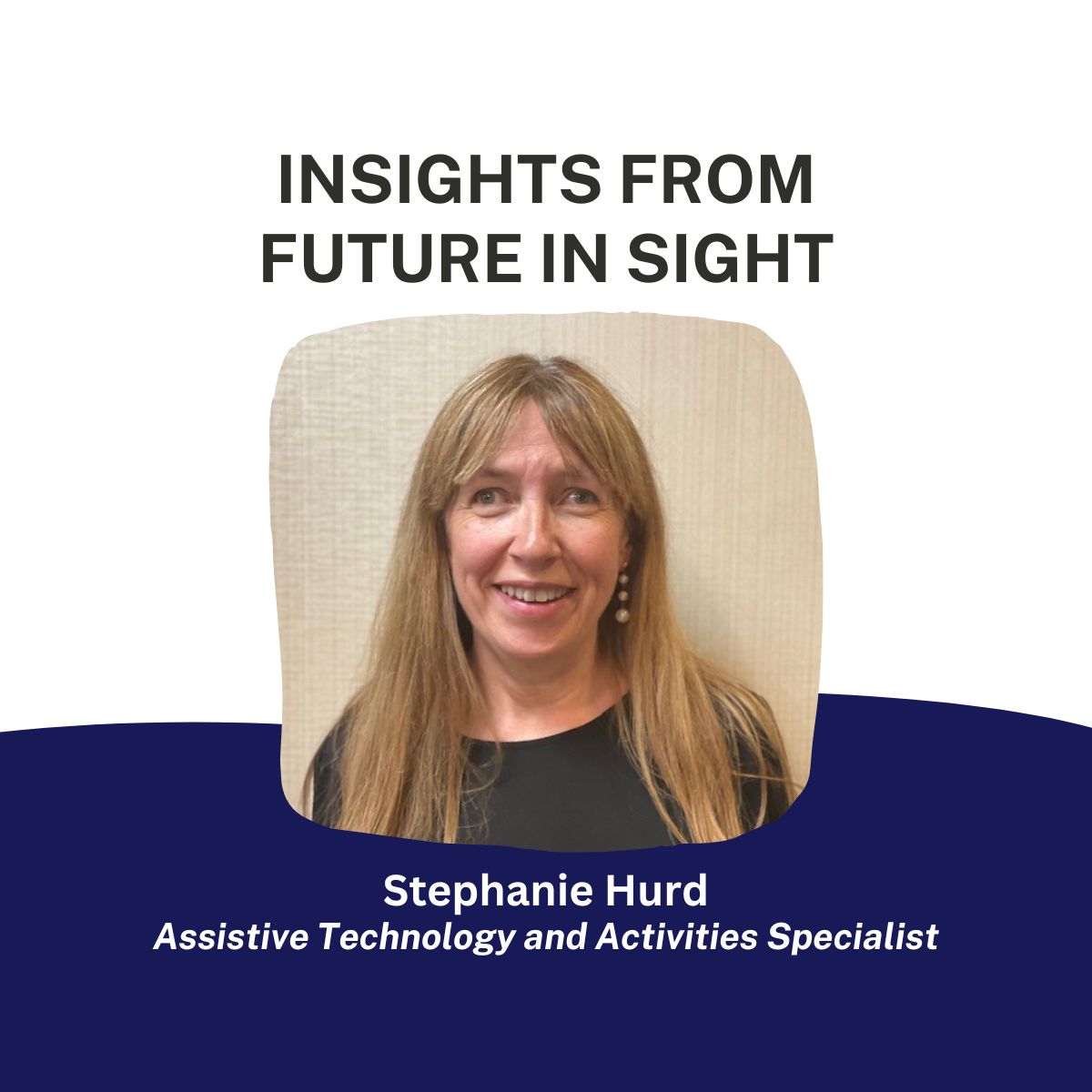
When considering what to share as a parent with sight loss, it’s difficult to know where to begin. What are the touch points and what should be filtered out? I have parented with high functioning vision impairment all the way to parenting without usable sight. I have parented a fully sighted child, as well as a child with some low vision. Here are some takeaways I am able to impart:
Q: What does it mean to be a parent who is blind or visually impaired?
A: Simply put, it means I am a mother who happens to not see as well as my fully sighted peers. I continue to do the “mom thing”, I just may do it a little differently. One example was when my children were little and loved going to local playgrounds. I’d follow them around and “play” with them, while many moms were sitting and chatting on a bench. They would keep their eyes on their little ones, but I would remain along side my children. We actually created lots of great, fun memories at the different parks. As they grew a bit older, I could attach some bells on their sneakers for audio location purposes. We began “trust” check-ins. Whenever I called them from the “mom bench”, they had to respond. If they did so, they would enjoy more time playing. If not, then we would go home. It’s true that kids learn quickly, and they were terrific about checking in.
Q: Does a blind or visually impaired parent require any specialized training?
A: Of course, all blind and visually impaired individuals should receive training in order to live fully and independently. This includes fundamental skills such as Orientation & Mobility, cooking, cleaning, personal care, technology, and other skills necessary for employment. There are some approaches unique to parenting with sight loss, which can be learned from specialists. When my oldest child was born, I needed to learn safe and practical techniques of how to walk with my white cane and my baby’s stroller. You might be thinking, which comes first the chicken or the egg? In my situation, the white cane is first held in front of me as an object detector before me and my infant. An Orientation & Mobility Specialist taught me how to do this while pulling the stroller with my other hand behind me. Because of this learned skill, my children and I took many practical walks to the local market and for pleasure around the neighborhood.
Q: What is one of the greatest challenges of being a parent with sight loss?
A: In a more rural state such as NH, the inability to drive was initially a perceived barrier. I remember going to a kindergarten activity for youth and families with my youngest child. We took a taxi. She kept reading what she thought was the clock, announcing the time rapidly changing. I guess time does fly in this case! In fact, it was the meter going up and up in price. We all chuckle at that, but it does bring home the point that it can be quite costly to get to all of the school functions you’d like to. I always instilled in both my children that if they wanted to play a sport, join a club, take music lessons and so on, that they should do so. My children were just that: children. I would figure out the transportation. I met lots of wonderful parents this way. I found a balance between volunteer services, family, other parents, taxis and Ubers over the years. One of my daughters played volleyball on her school team. Sometimes I had to cold call other team moms and request a ride home. One mom was more than eager to say yes, along with the statement that I might be able to reciprocate and bring her daughter home sometime! A good sense of humor goes a long way in sharing that I have sight loss and she might not want to take me up on that. Our daughters remain best friends to this day!
Q: Are there any positives as a parent with sight loss?
A: I’ve never known things to be any other way, but I do believe my children took away some valuable strengths from having a parent with sight loss. They are great communicators and self advocates. My younger daughter went fundraising with me for our annual Walk for Sight when she was about 9 years old. We went into some local establishments and without prompting, she said things like, “Excuse me, could we please speak to a manager? We’re with a statewide nonprofit and need your support!” There’s a girl who knew how to do things. I also recall passing the self advocacy baton in high school to my oldest, who played volleyball. She grew old enough and confident enough to reach out for her own transportation for practices until she obtained her own driver’s license. We meant it when we told stories of walking to the grocery store in the rain and snow. To this day, my driving daughter is sure to offer a ride to others in need. My children have learned a lot about blind and vision impairment; not about disability, but always about ability. They are strong, caring, young adults today.
Q: What type of skills were most beneficial?
A: I am extremely thankful for assistive technology over the years. I’d use a screen reader to be able to access permission slips, picture day order forms, report cards and lunch orders. Likewise using magnification tools, Siri, and Voiceover on my iPhone helped if I needed to text the teacher or another parent. The way technology has advanced, it improved things with each passing year.
In summary, being a parent with sight loss means that one has to be willing to step up their game with not only childcare skills, but also with services from organizations such as Future In Sight to be ready for parenthood. Blind or sighted or in between, it’s not a visual acuity that determines good parenting. It’s surrounding yourself with a network of support from great doctors, schools, family, and friends. Take initiative to ask for help or guidance when needed, yet hold yourself to the expectation that you’ve got this! If you know anything about parenthood, you realize you are never fully “ready”. It is an ever learning, ever flowing, challenging, most rewarding out of this world experience, which I am crazy enough and honored enough to be a part of in my lifetime!
We provide training, tools and resources to individuals of all ages who are blind and visually impaired and even offer a full calendar of activities. If you or someone you love is experiencing vision loss and could benefit from our services, please contact Future In Sight at services@futureinsight.org or 603-224-4039 today!
About the Author: Stephanie Hurd is the Assistive Technology & Activities Specialist at Future In Sight.

